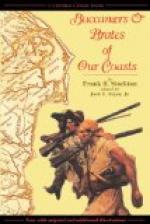Two days after that, Drake and his men came to a place called “The House of Crosses,” where they killed five or six peaceable merchants, but were greatly disappointed to find no gold, although the house was full of rich merchandise of various kinds. As his men had no means of carrying away heavy goods, he burned up the house and all its contents and went to his ships, and sailed away with the treasure he had already obtained.
Whatever this gallant ex-chaplain now thought of himself, he was considered by the Spaniards as an out-and-out pirate, and in this opinion they were quite correct. During his great voyage around the world, which he began in 1577, he came down upon the Spanish-American settlements like a storm from the sea. He attacked towns, carried off treasure, captured merchant-vessels,—and in fact showed himself to be a thoroughbred and accomplished pirate of the first class.
It was in consequence of the rich plunder with which his ships were now loaded, that he made his voyage around the world. He was afraid to go back the way he came, for fear of capture, and so, having passed the Straits of Magellan, and having failed to find a way out of the Pacific in the neighborhood of California, he doubled the Cape of Good Hope, and sailed along the western coast of Africa to European waters.
This grand piratical expedition excited great indignation in Spain, which country was still at peace with England, and even in England there were influential people who counselled the Queen that it would be wise and prudent to disavow Drake’s actions, and compel him to restore to Spain the booty he had taken from his subjects. But Queen Elizabeth was not the woman to do that sort of thing. She liked brave men and brave deeds, and she was proud of Drake. Therefore, instead of punishing him, she honored him, and went to take dinner with him on board his ship, which lay at Deptford.
So Columbus does not stand alone as a grand master of piracy. The famous Sir Francis Drake, who became vice-admiral of the fleet which defeated the Spanish Armada, was a worthy companion of the great Genoese.
These notable instances have been mentioned because it would be unjust to take up the history of those resolute traders who sailed from England, France, and Holland, to the distant waters of the western world for the purpose of legitimate enterprise and commerce, and who afterwards became thorough-going pirates, without trying to make it clear that they had shining examples for their notable careers.
Chapter III
Pupils in Piracy




